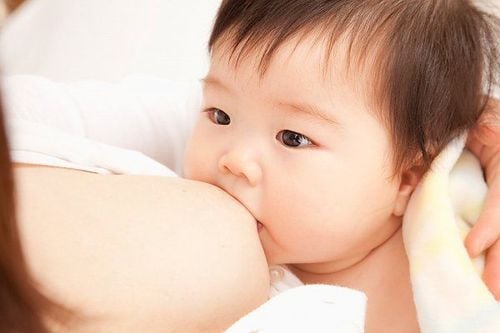This is an automatically translated article.
Children get sick very often from the weaning stage to the age of 3. The reason for this phenomenon is that the baby is going through the immune gap phase. So what should parents do to protect and "fill" the immunity gap in their children?
1. What is the immune gap phase?
When born, the child's body already exists antibodies from the mother to the baby during pregnancy. The antibodies are then also continued to be passed through breast milk while the baby is nursing, helping to protect the baby from infections during the first few months of life.
This passive immune system is passed on by the mother to the fetus in the fetus and then to the breast milk which gradually declines, for example IgG antibodies are transmitted through the placenta from the 3rd month of pregnancy, at the time of the mother When the baby is born, the baby's IgG level will reach the mother's and will gradually disappear around the baby's 3 months of age. For other antibodies such as IgA and white blood cells, complement protein, lysozyme and lactoferrin will decrease gradually around 6 months of age.
In general, passive antibodies do not stay forever in the baby's body, but will gradually decrease in number during the first 6 months after birth, even if the baby's immune system is still not mature enough to produce antibodies on its own. Therefore, the child's immunity will gradually weaken from the age of 6 months, the child is easy to get sick, easily infected, the child is not able to fight the disease.
From 6 months of age onwards, this is also the age when babies enter the phase of solid foods along with breastfeeding, but babies are breastfed less, so antibodies passed through breast milk also decrease. It is not until the age of 3-4 years that the child's active immune system is perfected, the child's body can now produce enough antibodies to help fight infections. The period from when babies start eating solid foods at 6 months old until they are 3 years old is a period when their immune system is weakened and forms an "immune gap period".
So the child's immune gap is the intersection of the child's passive and active immune systems, ranging from 6 months to 3 - 4 years old. In fact, children are very often sick from the age of 6 months, after 3 years of age, children will be less sick. Therefore, it is extremely important to protect children during the immune gap period. If they are well protected, they will be healthy, less sick, and develop well physically and mentally.

Bổ sung các vitamin, dưỡng chất hỗ trợ hệ miễn dịch cho trẻ trong giai đoạn khoảng trống miễn dịch
2. What to do to protect your child during the child's immune gap
Breast milk is likened to the most quintessential thing that a mother gives her child. Breast milk not only provides adequate nutrients for the baby to develop, but also an abundant source of antibodies, including IgG, IgA antibodies and white blood cells, complement proteins, lysozyme and lactoferrin... A natural barrier that helps children fight off pathogens.
According to recommendations, 6-month-old babies will start the weaning phase to get used to new foods, help their digestive systems learn and get used to them, so breastfeeding is more or less affected. enjoy. However, mothers should note that, although they have supplemented nutrients from food, at this stage, breast milk still plays a key role in providing nutrients for children, so mothers must continue to maintain breastfeeding. Mothers, help children "reinforce" the body's protective barrier.
If children are weaned early, they will face many causes of illness because they do not have adequate and timely resistance, so mothers should not wean the baby too soon and combine it with solid foods at the right time. point. Babies will get used to new foods while continuing to breastfeed.
It takes a long time for the child's body to produce antibodies on its own (when the child is 3 years old) to help him fight off pathogens, so the addition of vitamins and nutrients to support the immune system Immunization for children is very important to help strengthen the immune system and fill the immune gap in children.
Nowadays, life is busy, so instead of cooking suitable food for their children, many parents let their children eat fast food, junk food... with a lot of salt, bad fats increase levels of triglycerides and LDL cholesterol..., making children not able to tolerate enough essential nutrients and easily becoming obese, which is not recommended. Proper nutrition is a way to build an active immune barrier for children with a balanced diet between groups of substances: Protein, starch/sugar, fat, vitamins and minerals.
The fortification of micronutrients is extremely important including vitamins: A, D, C and minerals such as zinc, iron, selenium, calcium, magnesium... through daily food sources ( meat, fish, shrimp, crab, eggs, milk, vegetables, fruits). For example:
Foods rich in vitamin A: egg yolks, liver, yellow-red or dark green vegetables/vegetables/fruits; Foods rich in vitamin D such as egg yolks, cod liver oil Foods rich in vitamin C such as ripe fruits and green vegetables, grapefruit, oranges, tangerines, lemons... Zinc minerals are abundant in seafood such as oysters and clams. , egg yolks, chicken... Iron is abundant in liver, heart, beef, and chicken. Calcium is found in many foods such as: dairy products, shrimp, crab, fish... For children to eat. Adding yogurt daily is also very good to help provide nutrients and beneficial bacteria, which have an immune-boosting effect.
Strengthening children's outdoor activities helps the body synthesize vitamin D - an important vitamin to help strengthen the immune system. Vitamin D is very low in food, so regular exercise helps children have a healthier and more flexible body, and less prone to diseases.
Vaccinating children fully according to the vaccination schedule of the Ministry of Health is a mandatory requirement for children to get the necessary antibodies. Ensure children have a clean living space, free of dust and pollution, free of tobacco smoke, pipe tobacco, and coal smoke, and maintain clean body hygiene.
Children need to provide enough elemental zinc/day for them to eat well, reach the correct height and weight and exceed the standard. Zinc plays a role in affecting most biological processes taking place in the body, especially the breakdown of nucleic acids, proteins... Organs in the body when zinc deficiency can lead to a There are a number of diseases such as neurological disorders, irritability, etc. Therefore, parents need to learn about the role of zinc and guide them to appropriate zinc supplements for their children.
In addition to zinc, parents also need to supplement their children with other important vitamins and minerals such as lysine, chromium, B vitamins,... errands.
For more nutritional knowledge and child care for each age, parents should regularly visit the website vimec.com and make an appointment with the leading doctors, pediatric and nutrition experts of the National General Hospital. Vinmec when needing advice on children's health.













